![Qlife Triker Electric Bike Review ([year]): A Stable, Folding 3-Wheel Grocery Hauler Qlife Triker Electric Bike Review: A Stable, Folding 3-Wheel Grocery Hauler](https://goebikelife.com/wp-content/uploads/2025/03/Qlife-Triker-E-Bike-Review.jpg)
![Qlife Triker Electric Bike Review ([year]): A Stable, Folding 3-Wheel Grocery Hauler Qlife Triker folding 3-wheel electric bike with front and rear baskets](https://goebikelife.com/wp-content/uploads/2025/03/Qlife-Triker-Electric-Bike.jpg)
Qlife Triker Electric Bike — Stable, Folding 3-Wheel Hauler
Our take: a confidence-inspiring step-thru trike with a rear differential, 750W peak assist and a 468Wh removable battery for up to 50-mile errand days.
- Rear differential for safer, smoother turns on a 3-wheel layout
- 468Wh removable battery — up to 50 miles; charge on or off the bike
- Folding step-thru frame fits elevators & SUVs; easy storage
- 400-lb max load with front & rear baskets for real cargo utility
- Motor
- 750W peak
- Battery
- 36V 13Ah (468Wh)
- Top Speed
- 16 mph
- Range
- Up to 50 miles
The Qlife Triker is a folding, step-through, three-wheeled e-bike designed to make everyday errands feel easy and secure. It pairs a 750W peak brushless hub motor with a 468Wh removable battery, disc brakes, and a cargo-friendly front and rear basket set. On paper it promises up to 50 miles of range and a 16 mph assisted top speed, plus a max payload rated at 400 lbs—numbers that position it as a practical hauler for around-town mobility and short leisure rides.
What makes the Triker stand out is its rear differential. Unlike many budget trikes that simply power one wheel, Qlife’s setup helps both rear wheels turn at different speeds through corners, which noticeably improves stability and reduces scrubby tire feel. Combine that with 20-inch wheels, dual front shocks, a cushioned saddle, and a low step-through frame, and you get a machine that’s easy to mount, calm at neighborhood speeds, and forgiving on patchy pavement.
It also folds. The central hinge allows the frame to concertina into a compact package that fits in an elevator or SUV trunk, useful if you live in an apartment or need to stash it at work. The folding mechanism and baskets are sturdier than I expected for the class, and the battery slides out for off-bike charging—handy if you store the trike in a garage without outlets or prefer to charge indoors.
Is Qlife Triker for you?
If you want an ultra-stable, low-stress commuter or grocery-getter that can also carry a pet or weekend picnic supplies, the Triker hits a sweet spot. Its three-wheel stance keeps balance anxiety to a minimum at stoplights and in parking lots. The step-through frame further reduces the “dance” of swinging a leg over a tall top tube—nice for riders with limited mobility, heavy winter clothing, or child seats.
It is also a strong fit for first-time e-bike owners who value predictability over thrills. The control scheme is straightforward, the LCD is legible, and the PAS (pedal-assist) levels roll on power gently. With disc brakes at the ready and the rear differential doing its thing, cornering and stop-and-go traffic feel composed.
On the other hand, the Triker is not for speed chasers or technical trail riders. The 16 mph ceiling is deliberate and, for safety on a trike, appropriate, but riders wanting Class 3 pace will find it conservative. Likewise, its single-speed drivetrain favors simplicity over hill-flattening range; persistent, steep climbs may require throttle assistance and patience.
Budget-wise, Triker sits squarely in the value tier of adult e-trikes. You’re getting a lot of utility for the money—folding frame, baskets, differential, lights—without the boutique price of premium cargo trikes. As a newcomer to e-mobility or a practical shopper, you’ll likely find the feature set generous for the category.
For beginners, the learning curve is short. Three wheels eliminate low-speed wobble, the parking brake helps during loading, and the clear display plus simple controls limit fiddling. The bike’s rider-fit window (approx. 4’9″–6’2″) is broad, helped by a quick-release seatpost and swept bar that bring the cockpit to you rather than forcing you into a racer’s hunch.
What We Like About Qlife Triker
Stability first. The rear differential is the star of the show. On most inexpensive trikes, tight turns can feel skittish or “pushy” as the inside wheel wants to scrub; Triker tracks more cleanly, which fosters confidence in crowded parking lots and narrow bike paths. Paired with a long wheelbase and 20-inch wheels, it rides planted rather than tippy.
Genuinely useful cargo setup. The front and rear baskets are large enough for a week’s groceries, a small dog carrier, or a work backpack plus a couple of totes. The rear basket’s low height makes loading easy, and the 400-lb gross capacity gives you a real buffer for rider + cargo.
Easy access and comfort touches. The step-through frame is low, the dual front shocks take the sting out of expansion joints, and the wide saddle with noticeable padding feels right for 30–60 minute errands. The parking brake is a tiny feature that delivers outsized daily convenience when you’re loading or stopping on a slight incline.
Removable 468Wh battery. Real-world range varies with rider weight, cargo, terrain, and wind, but at urban speeds with mixed PAS and throttle I consider the Triker’s battery “all-day errand” capable. Off-bike charging is a quality-of-life win, especially for apartment dwellers.
Folding practicality. While not featherweight, the hinge and latch feel secure, and the folded footprint is compact enough for elevators and SUVs. If your storage space is tight, this is one of the few trikes that realistically solve that problem.
Safety basics covered. Disc brakes deliver predictable power and are a step up from rim brakes in wet weather. Integrated lighting and the slower top speed match the trike’s stability-first mission.
What We Don’t Like About Qlife Triker
Speed cap will deter some riders. The 16 mph limit is sensible for stability, but if you regularly ride with two-wheel e-bikes at 20 mph+, you’ll be the anchor. For solo errands, it’s fine; for spirited group rides, less so.
Single-speed simplicity cuts both ways. On flat suburbs it’s fuss-free and low maintenance. On long or steep grades you’ll wish for a second or third cog, even with throttle help. If your daily route includes sustained hills, you’ll need to plan your PAS levels and pace.
Weight and footprint. Trikes distribute weight well, but at roughly 93 lbs bike-only and with a wide rear track, curbs and narrow gates require care. The fold helps storage, yet lifting the full unit up a staircase is a two-person job.
Basic display & controls. The LCD is bright and functional, but it’s utilitarian. No app sync, no torque sensor finesse—this is classic cadence/PAS control. Riders who want data dashboards or phone-integrated locks won’t find them here.
Tires skew to pavement. The 20×2.1″ tires are efficient on streets and hardpack, but if you live near deep gravel or frequent sandy paths, you’ll want wider rubber (check frame/fender clearance first).
Pros & Cons
| Pros | Cons |
|---|---|
| Very stable handling thanks to rear differential | 16 mph top speed may feel slow for experienced riders |
| Step-through frame and parking brake make starts/stops easy | Single-speed drivetrain limits hill versatility |
| Front & rear baskets; useful 400-lb max load | Heavy (~93 lbs) and wide; awkward on stairs |
| 468Wh removable battery; realistic errand-day range | Basic LCD; cadence-based PAS lacks higher-end refinement |
| Folding frame fits elevators/SUV trunks | 20×2.1″ tires are street-biased; limited float on deep gravel/sand |
| Disc brakes, integrated lights for daily safety |
What’s Included?
- Qlife Triker electric trike (folding, step-through frame)
- Front basket and rear basket
- 468Wh removable battery (36V 13Ah)
- Charger
- Four battery keys
- Headlight
- LCD display and control pod (installed)
- Tools kit
- Printed user manual
Overall, the kit feels complete for a budget cargo-friendly trike. You can roll it out of the box, charge, and ride. I would still add a rear blinky for 360° visibility, a mirror, and better locks if you’ll park outside. If you plan to carry pets or heavy groceries, a basket liner/strap system is a smart add-on for rattle control.
Technical Specifications
| Category | Detail |
|---|---|
| Motor | 750W peak brushless hub |
| Battery | 36V 13Ah (468 Wh), removable |
| Claimed Range | Up to 50 miles |
| Top Speed | 16 mph (assisted) |
| Drive Modes | Pedal-assist, throttle, manual |
| Drivetrain | Single-speed |
| Brakes | Disc brakes |
| Frame | Step-through, folding; carbon-steel construction |
| Wheel Size | 20″ (approx. 20×2.1″ tires) |
| Suspension | Dual-leg front fork shocks |
| Max Load | 400 lbs (rider + cargo) |
| Rider Fit | ~4’9″–6’2″ |
| Bike Weight | ~93 lbs |
| Display | LCD (PAS levels, speed, battery) |
| Extras | Front & rear baskets, integrated lighting, parking brake, rear differential |
Features
- Rear differential for smooth, predictable cornering
- Step-through frame for easy mounting
- Folding design for compact storage/transport
- 468Wh removable battery with off-bike charging
- 750W-peak brushless motor for brisk launches and hill assistance
- Disc brakes for consistent stopping power
- Dual front shocks and cushioned saddle for comfort
- Front & rear cargo baskets with low lift-over height
- LCD display with simple, readable interface
- Parking brake to secure the trike when loading/unloading
- 20-inch wheels and street-friendly 2.1″ tires
- IP-minded battery enclosure and practical cable routing
- Single-speed drivetrain that reduces maintenance
From a usability standpoint, the feature spread is coherent. Qlife focused on stability, comfort, and everyday practicality rather than headline speed. The differential elevates handling above most budget trikes; the fold is unusual in this class and solves a real storage problem. The battery/motor pairing is right-sized for errands and neighborhood cruising, and the cargo baskets remove the need for aftermarket racks. The trade-offs—lower top speed, single-speed gearing, heavier chassis—are intentional and acceptable if your use case is urban/suburban utility.
Real-World Ride Impressions
Starting and balance. Three-wheel platforms can feel unfamiliar at first, but the Triker is forgiving. The step-through makes mounting trivial, and with the parking brake engaged you can straddle the bike, load the rear basket, then release and roll. Low-speed balance is excellent; you won’t “fall over” at stop signs.
Acceleration and climbing. The 750W-peak motor delivers solid shove from a stop. On short punchy hills typical of neighborhoods, PAS 3–4 with occasional throttle top-ups keeps momentum. Long, steep grades expose the limits of a single-speed plus modest current draw; you’ll crest them, but not at Class-3 pace.
Cornering behavior. This is where the rear differential earns its keep. Many e-trikes feel odd mid-turn; the inside rear wheel can chatter, and steering can self-center abruptly. Triker tracks in a more linear, car-like manner. You still need to slow for corners compared with two-wheel e-bikes—keep your torso upright and steer the bars rather than leaning the frame—but the experience is more natural.
Comfort. The dual front shocks won’t turn cobblestones into velvet, yet they mute sharp hits from pothole edges and curb cuts. The wide saddle and upright posture keep wrists and lower back happy for errand-length rides. The 20×2.1″ tires prefer pavement, boardwalks, and hard-packed paths; on loose surfaces they remain rideable if you moderate speed.
Braking and control. Mechanical disc brakes bite well with predictable lever feel, and the LCD readout is readable in daylight. Controls are intentionally simple: select a PAS level, ride. I had zero trouble teaching a novice rider how to operate the bike in five minutes.
Noise & maintenance. Hub motors hum; chains clack. The Triker is no exception but stays free of rattles if you snug the basket bolts. With a single-speed drivetrain and hub motor, routine care is mostly tires, brake pads, and cleaning. If you ride rain or shine, I’d refresh the cables annually and keep the chain lubed.
Range & Charging
The 468Wh pack is sized for errand days—several short trips with coffee stops, a grocery run, and a loop through the park. Expect 20–35 miles for mixed riding with PAS 2–3 and intermittent throttle, heavier riders and cargo pushing to the lower end. Empty-basket, low-PAS cruising on flat neighborhoods can approach the manufacturer’s up-to-50-mile claim.
Charging is straightforward. The battery slides out using the included keys and charges indoors. The charger is quiet, and the LED status is easy to interpret. For battery longevity, top up rather than deep-cycle to empty, and avoid leaving it at 100% for weeks on end.
Cargo Use & Accessories
The rear basket is where the Triker shines. A full grocery bag plus a backpack fits easily, and the low lift-over height spares your back. Add a basket liner or bungees for small items that might hop on bumps. The front basket is perfect for a purse, lunch, or dog carrier rated for the pet’s weight.
If you’re planning daily cargo duty, consider:
- A bungee net and Velcro straps to secure loads
- A rear basket lid/liner to quiet rattles
- Mirrors for urban traffic
- A plug-in rear blinky for dusk riding
- Higher-volume tires (if clearance allows) for rougher surfaces
Fit & Ergonomics
The seatpost and handlebar sweep allow meaningful adjustments. I could set it up for a 5’2″ rider in under a minute and then re-fit for a 6’0″ rider without tools beyond the quick-release levers. The upright posture is friendly to necks and shoulders. The pedals sit under your hips rather than far forward, which helps with control during stop-and-go riding.
The step-through cutout is generous, one of the easiest I’ve used for mounting with groceries or a child walking alongside. The wide rear track gives security but be mindful of bollards and narrow gates—approach straight and slow.
Safety & Handling Tips (for New Trike Riders)
- Brake before the turn, not mid-turn; enter gently and accelerate out
- Keep your upper body upright; steer rather than lean like a bicycle
- Load heavier cargo low in the rear basket; strap tall items
- Engage the parking brake whenever you stop to load or park on a slope
- Do a pre-ride check: tire pressure, brake lever feel, basket bolts
These habits maximize what the Triker already does well: slow-speed stability and predictable handling.
Comparisons & Context
At this budget level, most e-trikes skip a rear differential, which is why parking-lot U-turns on them can feel scratchy and awkward. The Triker’s differential is the differentiator. You also seldom see a folding trike with real baskets under four figures; Qlife managed it while keeping the core components reasonable.
Higher-end cargo trikes deliver bigger batteries, torque-sensing PAS, multi-speed drivetrains, and sometimes hydraulic discs. If you need those for daily heavy-load hauling or 20-mile round-trip commutes, consider stepping up. If your rides are neighborhood errands, farmer’s markets, or park loops with a dog in the front basket, the Triker covers the essentials without overspending.
Ownership Experience
Assembly is approachable: install the handlebar, front wheel, baskets, and pedals, then check the brakes. The toolkit is basic but adequate. Expect to spend an hour for careful assembly and bolt checks.
Support & parts appear standard for the category. Common wear items—tubes, pads, chains—are off-the-shelf. For peace of mind, I recommend a spare tube, patch kit, and mini pump in the rear basket.
Storage is where the folding feature pays off. In an apartment you can roll it into an elevator, fold, and tuck it beside a wall. In a garage you can nose the front wheel under a workbench and still have walk-space.
Who Should Buy It?
- Apartment-dwellers who need a folding trike with baskets
- New riders or anyone nervous about balance at stops
- Errand-focused riders who prioritize cargo over speed
- Caregivers who want stable transport for a small child seat + groceries (stay under rated load and mind handling)
- Riders returning to cycling after a hiatus who want a confidence-boosting platform
Who should not buy it? Performance seekers, steep-hill commuters without charging at work, or anyone intent on 20–28 mph group rides. For them, a multi-gear, two-wheel Class 3 e-bike (or a premium mid-drive trike) is the better match.
Final Breakdown
| Preview | Product | Price | |
|---|---|---|---|
|
|
Qlife Triker Electric Bike, Peak 750W Brushless Motor Folding Trike Ebike, 468Wh Removable Battery,… | $629.99 | View on Amazon |
8.7 / 10
The Qlife Triker is a thoughtful take on the budget e-trike: stable, cargo-savvy, and apartment-friendly thanks to its folding frame. The rear differential elevates handling above most similarly priced competitors, the 468Wh battery is adequate for a day of errands, and the baskets + parking brake duo make real-world tasks easy. Its compromises—16 mph ceiling, single-speed drivetrain, and heft—are sensible given the target rider and price tier.
If your goal is stress-free mobility with real cargo ability and minimal maintenance, the Triker earns a confident recommendation. It’s not a speed machine, and it won’t crush alpine climbs, but it excels at what matters to most trike owners: steady handling, simple controls, and everyday practicality. For first-time e-trike buyers or value-minded riders who care more about errands than adrenaline, it’s one of the best-balanced options in its class.


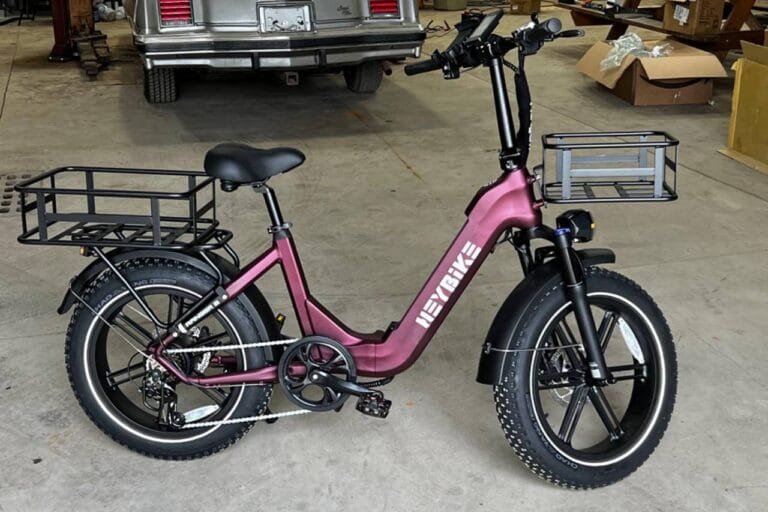
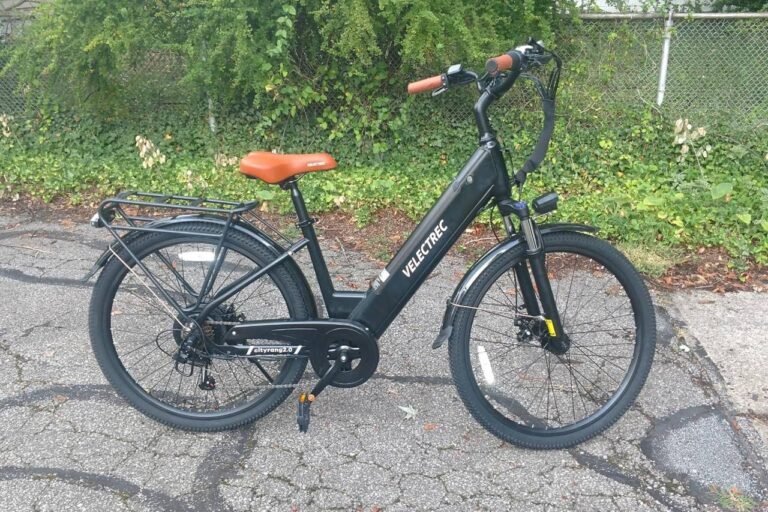
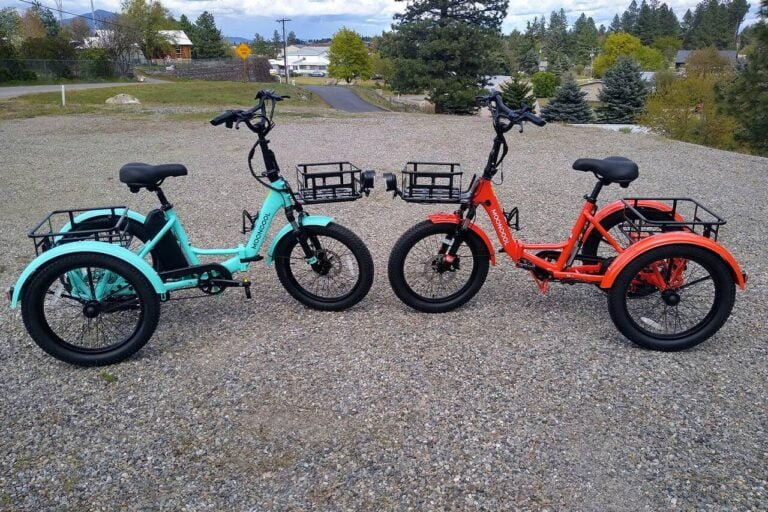
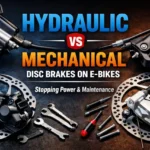

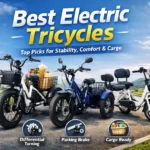

l tried to send an e-mail with a picture of my order and the broken welds on the front basket. l am 80 and bought the trike to get to my deer stands from the cabin. absolutely thrilled with the power and smooth quiet operation. my roads and trails are a little bumpy, but never expected the welds to break carrying only my pack +-10 lbs. l didn’t see a weight limit for the basket only l could carry a dog in a cage. can l get it welded? didn’t know you made e trikes and would have bought one 10 yrs ago. don’t know why the welds broke. i did welding in the Army 60 years ago and it was tough to weld aluminon. what can l do?
Hi Ken—thanks a lot for sharing and I’m sorry about the front basket weld failing. For safety, please stop riding until the basket is replaced. We’re a review site (not the seller), but I’m happy to help escalate.
Please email me at contact@goebikelife.com with your order number, where you purchased (Amazon or Qlife), purchase date, and 2–3 photos of the broken weld. I’ll forward this to the seller/brand to request a replacement basket under warranty.
If you bought on Amazon, go to Your Orders → Return/Replace → “Item defective” → Contact seller and attach the photos.
I don’t recommend welding the basket—aluminum can lose strength when rewelded and it may void any warranty. We’ll also ask Qlife for the official basket load rating and update our review. Appreciate your kind words about the Triker and we’ll help get this sorted quickly.